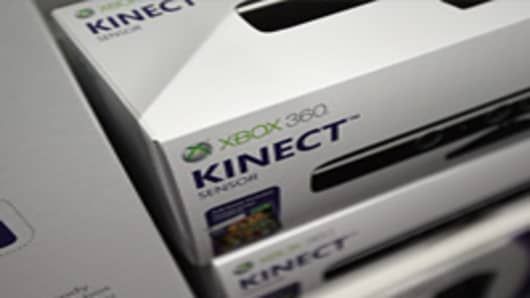After a year of disappointing sales figures and investor malaise, the video game industry is feeling some seasonal cheer.
The kick off to the holidays has been a boom time for game makers this year – with stellar sales for both hardware and software.
The question for investors, though, is whether this seasonal bump is the start of a turnaround for gaming companies – or just a short-term surge that will fade away by the end of December.
The numbers, if nothing else, are cause for cheer.
Nintendo reports it sold 1.5 million Wii and DS units over the Black Friday weekend – matching its holiday 2009 pace, which set sales records for the company.
Microsoft, meanwhile, has sold 2.5 million Kinect motion control sensors in just 25 days, putting it well on pace to hit its goal of 5 million before the year is complete. And Activision saw “Call of Duty: Black Ops” generate sales of $650 million in its first five days on shelves – an 18 percent (and $100 million) improvement over last year’s “Modern Warfare 2”.
Analysts acknowledge that the numbers are welcome news, but warn that investors looking for a return to the industry’s glory days could be in for a disappointment.
“I would characterize this as a seasonal lift, for sure,” says Colin Sebastian of Lazard Capital Markets. “But I would also say there are signs of life. It would be too strong, though, to conclude that the industry is back on track. There are a lot of games out there that aren’t selling particularly well. We’re still stuck in this land of haves and have-nots.”
Among the “haves” is Activision, which not only has “Call of Duty” boosting its bottom line this year, but will also be releasing “World of Warcraft: Cataclysm” in early December – the latest expansion in the industry’s largest massively multiplayer game. (Over 12 million people around the world pay a monthly fee to play, currently.)
THQ has also gained some momentum, thanks to the successful launch of its uDraw tablet for the Wii, allowing people to play games like “Pictionary” on their TVs.
Leading the have-nots is Electronic Arts, which has had several titles that haven’t established a foothold at retail. The reboot of the “Medal of Honor” franchise was a sales disappointment and “Need for Speed: Hot Pursuit,” while adored by players and critics, isn’t looking like a strong seller either – perhaps being caught in the backwash of Sony’s “Gran Turismo 5,” which is considered the industry’s premier racing game.
2011, meanwhile, is a fuzzy picture for the industry. The game lineup for Kinect is still unclear, which makes it hard to gauge whether Microsoft will be able to keep the momentum up for that device. While the novelty of Kinect is helping to sell it during the holidays, the system will need a strong lineup of games to keep audiences engaged.
Nintendo will provide a spark at the end of March, with the launch of the 3DS- a new handheld gaming system that offers stereoscopic 3D images without the need for special glasses - but the long-term success of that device will likely be dependent on pricing.
Among publishers, though, the negative trend at retail is likely to continue, says Sebastian. The industry is going through a paradigm shift that makes it harder for investors to profit from. The rise of mobile gaming, fueled by Apple’s iDevices, and social network games continues to distract casual gamers – who, in previous generations, have spent heavily on games at this point in the console cycle.
“That’s a story investors may not understand,” says Sebastian. “The packaged goods business is challenged and [traditional] publishers are publishing fewer games each year. The titles they are putting out seem to be slanted toward the core gamer. … I see a continuation of current trends [in 2011].”


